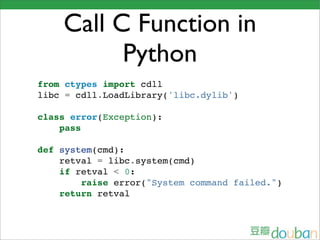Python高级编程(二)
- 1. Advanced Python Programming (Part II) Happy Day #5 2011.10
- 2. Topics • Performance Tuning • Garbage Collection • Extending Python
- 4. Python's Speed Among Most Popular Languages C C++ Java Lisp C# Pascal Python Ruby PHP Perl data source (on Oct.17, 2011): • http://www.tiobe.com/index.php/content/paperinfo/tpci/index.html • http://shootout.alioth.debian.org/u64q/which-programming-languages-are-fastest.php
- 5. 7 Steps to Gain Speed 1) Find performance bottlenecks 2) Use better algorithms 3) Use faster tools 4) Write optimized code 5) Hire optimizers 6) Write your own extension modules 7) Parallelize the computation
- 6. Step 0 Is It Fast Enough Already?
- 7. Step 1 Find Performance Bottlenecks
- 8. Find Performance Bottlenecks • Profile, no guess - profile • a pure Python module - cProfile • written in C, new in Python 2.5 • same interface with profile, but lower overhead - hotshot • written in C, new in Python 2.2 • not maintained and might be removed
- 9. cProfile Usage • cProfile.run('foo()') • cProfile.run('foo()', 'profile.result') • python -m cProfile -o profile.result myscript.py • p = pstats.Stats('profile.result') • p.sort_stats('cumulative').print_stats() • sort by 'cumulative' to find what algorithms are taking time • sort by 'time' to find what functions are taking time • RunSnakeRun for GUI guys • RTFM, please • for IPython, type %prun?
- 10. Line Profile • line_profile and kernprof @profile def slow_function(): ... $ kernprof.py -l -v script_to_profile.py ... Line # Hits Time Per Hit % Time Line Contents ============================================================== 1 @profile 2 def slow_function(): 3 1 3 3.0 0.2 s = 0 4 1001 934 0.9 48.6 for i in xrange(1000): 5 1000 984 1.0 51.2 s += i 6 1 1 1.0 0.1 return s
- 11. Step 2 Use Better Algorithms
- 12. How To Know Which is Better? • timeit! • python -m timeit -s "setup" "statement" • e.g. which is faster, "d.has_key(k)" or "k in d"? $ python -m timeit -s "d=dict(zip(range(1000), range(1000)))" "d.has_key(500)" 1000000 loops, best of 3: 0.223 usec per loop $ python -m timeit -s "d=dict(zip(range(1000), range(1000)))" "500 in d" 10000000 loops, best of 3: 0.115 usec per loop
- 13. Use Bettern Algorithms • How to calculate sum([1, 2, ..., 100])?
- 14. Use Bettern Algorithms • How to calculate sum([1, 2, ..., 100])? s = 0 for i in range(101): 8.3usec s += i
- 15. Use Bettern Algorithms • How to calculate sum([1, 2, ..., 100])? s = 0 for i in range(101): 8.3usec s += i s = sum(range(101)) 2.8usec
- 16. Use Bettern Algorithms • How to calculate sum([1, 2, ..., 100])? s = 0 for i in range(101): 8.3usec s += i s = sum(range(101)) 2.8usec s = sum(xrange(101)) 2.03usec
- 17. Use Bettern Algorithms • How to calculate sum([1, 2, ..., 100])? s = 0 for i in range(101): 8.3usec s += i s = sum(range(101)) 2.8usec s = sum(xrange(101)) 2.03usec s = (1 + 100) * 100 / 2 0.109usec
- 18. Advanced Data Types • membership testing: • set & dict: O(1) vs. tuple & list: O(n) • return iterator instead of a large list • array, collections.deque, heapq, bisect
- 19. Examples lst = [] for i in xrange(10000): lst.insert(0, i) lst = collections.deque() for i in xrange(10000): 25317% faster lst.appendleft(i) sorted(lst, reverse=True)[:10] heapq.nlargest(10, lst) 613% faster
- 20. Do Less Computation • Pre-computation • Lazy computation • Cache • Approximation Algorithms
- 21. Example def fib(n): if n <= 1: return 1 fib(25): 59.8ms return fib(n-2) + fib(n-1)
- 22. Example def cache(func): c = {} def _(n): r = c.get(n) fib(25): 59.8ms if r is None: r = c[n] = func(n) return r return _ with @cache: @cache fib(25): 0.524us def fib(n): if n <= 1: return 1 112000 times faster! return fib(n-2) + fib(n-1)
- 23. Step 3 Use Faster Tools
- 24. Use Faster Tools • use iterator form • range() -> xrange() • map() -> itertools.imap() • list comprehension -> generator expression • dict.items() -> dict.iteritems() • for i in range(len(seq)): -> • for item in seq: • for i, item in enumerate(seq):
- 25. Use Faster Tools • SAX is faster and memory efficient than DOM • use C version of modules • profile -> cProfile • StringIO -> cStringIO • pickle -> cPickle • elementTree -> cElementTree / lxml • select has lower overhead than poll (and epoll at low number of connections) • numpy is essential for high volume numeric work
- 26. numpy Example from itertools import izip a=range(1000) b=range(1000) c = [ai+bi for ai, bi in izip(a, b)] import numpy a=numpy.arange(1000) b=numpy.arange(1000) c = a + b
- 27. Step 4 Write Optimized Code
- 28. Write Optimized Code • Less temporary objects • e.g. accumulator vs. sum • however, string concatenation has been optimized after Python 2.5
- 29. Write Optimized Code • use key= instead of cmp= when sorting lst = open('/Users/hongqn/projects/shire/luzong/ group.py').read().split() lst.sort(cmp=lambda x, y: cmp(x.lower(), y.lower())) lst.sort(key=str.lower) 377% faster
- 30. Write Optimized Code • local variables are faster than global variables def f(): for i in xrange(10000): r = abs(i) def f(): _abs = abs for i in xrange(10000): r = _abs(i) 28% faster • you can eliminate dots, too
- 31. Write Optimized Code • inline function inside time-critical loops def f(x): return x + 1 for i in xrange(10000): r = f(i) for i in xrange(10000): r = i + 1 187% faster
- 32. Write Optimized Code • do not import modules in loops for i in xrange(10000): import string r = string.lower('Python') import string for i in xrange(10000): r = string.lower('Python') 178% faster
- 33. Write Optimized Code • list comprehensions are faster than for- loops lst = [] for i in xrange(10000): lst.append(i) lst = [i for i in xrange(10000)] 213% faster
- 34. Write Optimized Code • use "while 1" for time-critical loops (readability lost!) a = 0 while True: a += 1 if a > 10000: break a = 0 while 1: a += 1 if a > 10000: 78% faster break
- 35. Write Optimized Code • "not not x" is faster than "bool(x)" (not recommended!) bool([]) not not [] 196% faster
- 37. Hire Optimizers • sys.setcheckinterval() • Python checks for thread switch and signal handling periodly (default 100 python virtual instructions) • set it to a larger value for better performance in cost of responsiveness
- 38. Hire Optimizers • gc.disable() • disable automatic garbage collection • gc.set_threshold() • collect less frequently
- 39. Hire Optimizers • Psyco • JIT for 32bit only. <=Python 2.6 • PyPy • Alternative implementation of Python • Shed Skin • Python-to-C++ compiler • numexpr • numpy expression evaluator
- 40. Step 6 Write Your Own Extension Modules
- 41. Write Your Own Extension Modules • Python/C API • Official API • ctypes • Call dynamic link library in Python • SWIG • Automatically generate interface code • Pyrex / Cython • write extension using Python-like language • Boost.Python • C++ API • Weave • Inline C code
- 42. Write Your Own Extension Modules • C-level Optimization
- 43. Step 7 Parallelize the Computation
- 44. Over CPUs • multi-threading • threading (be careful with GIL!) • multi-processing • fork • subprocess • multiprocessing • async • asyncore • twisted • greenlet/gevent • PyOpenCL / PyCUDA
- 45. multiprocessing Example sum(xrange(1, 10000001)) 172ms from multiprocessing import Pool pool = Pool() sum(pool.map(sum, (xrange(i, i+1000000) for i in xrange(1, 10000000, 1000000)))) 104ms on dual-core 49ms on 8-core
- 46. Over Cluster • XML-RPC / Json-RPC / Thrift / Protocol Buffer • Pyro • Parallel Python • dumbo on Hadoop • dpark
- 47. Gold Rule Premature optimization is the root of all evil. -- Donald Knuth
- 49. What Is Garbage • An object which will not be used in any future • i.e. no other object refers to it
- 50. Why Collecting Garbage? • re-sell it (recycle) • make programs simpler
- 51. Garbage Collection in Everywhere • by lilinghui, Sep.20, 2011 • http://svn.douban.com/projects/shire/wiki/ HallOfFire/Platform
- 52. Basic Garbage Collection Algorithms • Reference couting • Mark-and-sweep • Mark-and-compact • Copy
- 53. Garbage Collection in CPython • Reference couting • Mark-and-sweep
- 54. Reference Counting def f(): a = A() a.b = B() a.b.c = C() a.c = b.c
- 55. Reference Counting def f(): frame a = A() a.b = B() a.b.c = C() a b a.c = b.c 1 1 c 2
- 56. Reference Counting def f(): frame a = A() a.b = B() a.b.c = C() a b a.c = b.c 1 1 del a.c c 2
- 57. Reference Counting def f(): frame a = A() a.b = B() a.b.c = C() a b a.c = b.c 1 1 del a.c c 1
- 58. Reference Counting def f(): frame a = A() a.b = B() a.b.c = C() a b a.c = b.c 1 1 del a.c del a.b c 1
- 59. Reference Counting def f(): frame a = A() a.b = B() a.b.c = C() a b a.c = b.c 1 0 del a.c del a.b c 1
- 60. Reference Counting def f(): frame a = A() a.b = B() a.b.c = C() a a.c = b.c 1 del a.c del a.b c 0
- 61. Reference Counting def f(): frame a = A() a.b = B() a.b.c = C() a a.c = b.c 1 del a.c del a.b
- 62. Reference Counting def f(): a = A() a.b = B() a.b.c = C() a a.c = b.c 0 del a.c del a.b
- 63. Reference Counting def f(): a = A() a.b = B() a.b.c = C() a.c = b.c del a.c del a.b
- 64. Pros & Cons of Reference Counting • Pros • collect early • predictable run-time behavior • Cons • slow • circle reference
- 65. Circle Reference def f(): frame a = A() a.b = B() a.b.c = C() a b a.b.c.b = a.b 1 2 c 1
- 66. Circle Reference def f(): frame a = A() a.b = B() a.b.c = C() a b a.b.c.b = a.b 1 2 del a.b c 1
- 67. Circle Reference def f(): frame a = A() a.b = B() a.b.c = C() a b a.b.c.b = a.b 1 1 del a.b c 1
- 68. Circle Reference def f(): a = A() a.b = B() a.b.c = C() b a.b.c.b = a.b 1 del a.b c 1
- 69. Weak Reference a reference not strong enough to keep an object alive >>> import weakref import weakref >>> class Object: ... pass _id2obj_dict = weakref.WeakValueDictionary() ... >>> o = Object() def remember(obj): >>> r = weakref.ref(o) oid = id(obj) >>> o2 = r() _id2obj_dict[oid] = obj >>> o is o2 return oid True >>> del o, o2 def id2obj(oid): >>> print r() return _id2obj_dict[oid] None
- 70. Mark-and-Sweep frame 1. Mark root objects and all their referents reachable a b 2. Sweep unreachable 1 1 objects c 1
- 71. Generations • generations and thresholds • generation 0 (youngest): 700 • generation 1 (middle):10 • generation 2 (oldest): 10 • and long_lived_pending / long_lived_total > 25% (Python 2.7+)
- 72. Python's Optimization • Track only container objects • Use referent count to find root objects
- 73. __del__ • circle referenced objects with __del__() methods will be put in gc.garbage • do not use __del__
- 74. GC Module • gc.enable() / gc.disable() • gc.collect() • gc.get_threshold() / gc.set_threshold() • gc.set_debug() • gc.get_referers() / gc.get_referents() • gc.get_objects()
- 75. Extending Python
- 76. Python/C API
- 77. #include <Python.h> static PyObject *SpamError; static PyObject * spam_system(PyObject *self, PyObject *args) { const char *command; int sts; if (!PyArg_ParseTuple(args, "s", &command)) return NULL; sts = system(command); if (sts < 0) { PyErr_SetString(SpamError, "System command failed"); return NULL; } return PyLong_FromLong(sts); } static PyMethodDef SpamMethods[] = { {"system", spam_system, METH_VARARGS, "Execute a shell command."}, {NULL, NULL, 0, NULL} /* Sentinel */ }; PyMODINIT_FUNC initspam(void) { PyObject *m; m = Py_InitModule("spam", SpamMethods); if (m == NULL) return; SpamError = PyErr_NewException("spam.error", NULL, NULL); Py_INCREF(SpamError); PyModule_AddObject(m, "error", SpamError); }
- 78. Building with setuptools from setuptools import setup, Extension module1 = Extension('spam', sources = ['spam.c']) setup (name = 'PackageName', version = '1.0', description = 'This is a demo package', ext_modules = [module1]) python setup.py install python setup.py build_ext --inplace
- 79. Parse and Build Values • int PyArg_ParseTuple(PyObject *args, const char *format, ...) • int PyArg_ParseTupleAndKeywords(PyObject *args, PyObject *kw, const char *format, char *keywords[], ...) • int PyArg_BuildValue(const char *format, ...)
- 80. Manage Reference Counting • Py_INCREF(PyObject *o) / Py_XINCREF(PyObject *o) • Py_DECREF(PyObject *o) / Py_XINCREF(PyObject *o) / Py_CLEAR(PyObject *o) • New/Borrowed/Stealing references
- 81. Exception Handling • errno-like mechanism • PyErr_SetString() / PyErr_SetObject() to set error • PyErr_Occurred() to check error • Most functions return an error indicator, e.g. NULL, -1
- 82. Global Interpreter Lock • Release GIL before running blocking C code Py_BEGIN_ALLOW_THREADS ...Do some blocking I/O operation... Py_END_ALLOW_THREADS • Reacquire GIL before calling into Python functions PyGILState_STATE gstate; gstate = PyGILState_Ensure(); /* Perform Python actions here. */ result = CallSomeFunction(); /* evaluate result */ /* Release the thread. No Python API allowed beyond this point. */ PyGILState_Release(gstate);
- 83. Cython / Pyrex
- 84. Python Style Code from libc.stdlib cimport system as c_system class error(Exception): pass def system(char* cmd): cdef int retval = c_system(cmd) if retval < 0: raise error("System command failed") return retval
- 85. setup.py from setuptools import setup, Extension from Cython.Distutils import build_ext extmod = Extension("spam", sources=['spam.pyx']) setup( name="Spam", cmdclass = {'build_ext': build_ext}, ext_modules = [extmod])
- 86. #include <Python.h> #include "structmember.h" static PyGetSetDef Noddy_getseters[] = { Extension Types typedef struct { {"first", PyObject_HEAD (getter)Noddy_getfirst, (setter)Noddy_setfirst, PyObject *first; "first name", PyObject *last; NULL}, int number; {"last", } Noddy; (getter)Noddy_getlast, (setter)Noddy_setlast, "last name", static void NULL}, Noddy_dealloc(Noddy* self) {NULL} /* Sentinel */ { }; Py_XDECREF(self->first); Py_XDECREF(self->last); static PyObject * self->ob_type->tp_free((PyObject*)self); Noddy_name(Noddy* self) } { static PyObject *format = NULL; static PyObject * PyObject *args, *result; Noddy_new(PyTypeObject *type, PyObject *args, PyObject *kwds) { if (format == NULL) { Noddy *self; format = PyString_FromString("%s %s"); if (format == NULL) self = (Noddy *)type->tp_alloc(type, 0); return NULL; if (self != NULL) { } self->first = PyString_FromString(""); if (self->first == NULL) args = Py_BuildValue("OO", self->first, self->last); { if (args == NULL) Py_DECREF(self); return NULL; return NULL; } result = PyString_Format(format, args); Py_DECREF(args); self->last = PyString_FromString(""); if (self->last == NULL) return result; { } Py_DECREF(self); return NULL; static PyMethodDef Noddy_methods[] = { } {"name", (PyCFunction)Noddy_name, METH_NOARGS, "Return the name, combining the first and last name" self->number = 0; }, } {NULL} /* Sentinel */ }; return (PyObject *)self; } static PyTypeObject NoddyType = { PyObject_HEAD_INIT(NULL) static int 0, /*ob_size*/ Noddy_init(Noddy *self, PyObject *args, PyObject *kwds) "noddy.Noddy", /*tp_name*/ { sizeof(Noddy), /*tp_basicsize*/ PyObject *first=NULL, *last=NULL, *tmp; 0, /*tp_itemsize*/ (destructor)Noddy_dealloc, /*tp_dealloc*/ static char *kwlist[] = {"first", "last", "number", NULL}; 0, /*tp_print*/ 0, /*tp_getattr*/ if (! PyArg_ParseTupleAndKeywords(args, kwds, "|SSi", kwlist, 0, /*tp_setattr*/ &first, &last, 0, /*tp_compare*/ &self->number)) 0, /*tp_repr*/ return -1; 0, /*tp_as_number*/ 0, /*tp_as_sequence*/ if (first) { 0, /*tp_as_mapping*/ tmp = self->first; 0, /*tp_hash */ Py_INCREF(first); 0, /*tp_call*/ self->first = first; 0, /*tp_str*/ Py_DECREF(tmp); 0, /*tp_getattro*/ } 0, /*tp_setattro*/ 0, /*tp_as_buffer*/ if (last) { Py_TPFLAGS_DEFAULT | Py_TPFLAGS_BASETYPE, /*tp_flags*/ tmp = self->last; "Noddy objects", /* tp_doc */ Py_INCREF(last); 0,! ! /* tp_traverse */ self->last = last; 0,! ! /* tp_clear */ Py_DECREF(tmp); 0,! ! /* tp_richcompare */ } 0,! ! /* tp_weaklistoffset */ 0,! ! /* tp_iter */ return 0; 0,! ! /* tp_iternext */ } Noddy_methods, /* tp_methods */ Noddy_members, /* tp_members */ static PyMemberDef Noddy_members[] = { Noddy_getseters, /* tp_getset */ {"number", T_INT, offsetof(Noddy, number), 0, 0, /* tp_base */ "noddy number"}, 0, /* tp_dict */ {NULL} /* Sentinel */ 0, /* tp_descr_get */ }; 0, /* tp_descr_set */ 0, /* tp_dictoffset */ static PyObject * (initproc)Noddy_init, /* tp_init */ Noddy_getfirst(Noddy *self, void *closure) 0, /* tp_alloc */ { Noddy_new, /* tp_new */ Py_INCREF(self->first); }; return self->first; } static PyMethodDef module_methods[] = { {NULL} /* Sentinel */ static int }; Noddy_setfirst(Noddy *self, PyObject *value, void *closure) { #ifndef PyMODINIT_FUNC! /* declarations for DLL import/export */ if (value == NULL) { #define PyMODINIT_FUNC void PyErr_SetString(PyExc_TypeError, "Cannot delete the first attribute"); #endif return -1; PyMODINIT_FUNC } initnoddy3(void) { if (! PyString_Check(value)) { PyObject* m; PyErr_SetString(PyExc_TypeError, "The first attribute value must be a string"); if (PyType_Ready(&NoddyType) < 0) return -1; return; } m = Py_InitModule3("noddy3", module_methods, Py_DECREF(self->first); "Example module that creates an extension type."); Py_INCREF(value); self->first = value; if (m == NULL) return; return 0; } Py_INCREF(&NoddyType); PyModule_AddObject(m, "Noddy", (PyObject *)&NoddyType); static PyObject * } Noddy_getlast(Noddy *self, void *closure) { Py_INCREF(self->last); return self->last; } static int Noddy_setlast(Noddy *self, PyObject *value, void *closure) { if (value == NULL) { PyErr_SetString(PyExc_TypeError, "Cannot delete the last attribute"); return -1; } if (! PyString_Check(value)) { PyErr_SetString(PyExc_TypeError, "The last attribute value must be a string"); return -1; } Py_DECREF(self->last); Py_INCREF(value); self->last = value; return 0; }
- 87. #include <Python.h> #include "structmember.h" static PyGetSetDef Noddy_getseters[] = { Extension Types typedef struct { {"first", PyObject_HEAD (getter)Noddy_getfirst, (setter)Noddy_setfirst, PyObject *first; "first name", PyObject *last; NULL}, int number; {"last", } Noddy; (getter)Noddy_getlast, (setter)Noddy_setlast, "last name", static void NULL}, Noddy_dealloc(Noddy* self) {NULL} /* Sentinel */ { }; Py_XDECREF(self->first); Py_XDECREF(self->last); static PyObject * self->ob_type->tp_free((PyObject*)self); Noddy_name(Noddy* self) } { static PyObject *format = NULL; static PyObject * PyObject *args, *result; Noddy_new(PyTypeObject *type, PyObject *args, PyObject *kwds) { if (format == NULL) { Noddy *self; format = PyString_FromString("%s %s"); if (format == NULL) self = (Noddy *)type->tp_alloc(type, 0); return NULL; if (self != NULL) { } self->first = PyString_FromString(""); if (self->first == NULL) args = Py_BuildValue("OO", self->first, self->last); { if (args == NULL) Py_DECREF(self); return NULL; return NULL; } result = PyString_Format(format, args); Py_DECREF(args); self->last = PyString_FromString(""); if (self->last == NULL) return result; { Py_DECREF(self); } cdef class Noddy: return NULL; static PyMethodDef Noddy_methods[] = { } {"name", (PyCFunction)Noddy_name, METH_NOARGS, "Return the name, combining the first and last name" }, """Noddy objects""" self->number = 0; } {NULL} /* Sentinel */ }; return (PyObject *)self; } static int static PyTypeObject NoddyType = { PyObject_HEAD_INIT(NULL) 0, /*ob_size*/ cdef object first, last "noddy.Noddy", /*tp_name*/ Noddy_init(Noddy *self, PyObject *args, PyObject *kwds) { PyObject *first=NULL, *last=NULL, *tmp; sizeof(Noddy), 0, /*tp_basicsize*/ /*tp_itemsize*/ cdef public int number (destructor)Noddy_dealloc, /*tp_dealloc*/ static char *kwlist[] = {"first", "last", "number", NULL}; 0, /*tp_print*/ 0, /*tp_getattr*/ if (! PyArg_ParseTupleAndKeywords(args, kwds, "|SSi", kwlist, 0, /*tp_setattr*/ &first, &last, &self->number)) 0, 0, 0, /*tp_compare*/ /*tp_repr*/ /*tp_as_number*/ def __cinit__(self, str first="", str last="", int number=0): return -1; if (first) { 0, 0, 0, /*tp_as_sequence*/ /*tp_as_mapping*/ /*tp_hash */ self.first = first tmp = self->first; Py_INCREF(first); self->first = first; Py_DECREF(tmp); 0, 0, 0, /*tp_call*/ /*tp_str*/ /*tp_getattro*/ self.last = last 0, /*tp_setattro*/ } if (last) { 0, /*tp_as_buffer*/ Py_TPFLAGS_DEFAULT | Py_TPFLAGS_BASETYPE, /*tp_flags*/ self.number = number tmp = self->last; "Noddy objects", /* tp_doc */ Py_INCREF(last); 0,! ! /* tp_traverse */ self->last = last; 0,! ! /* tp_clear */ Py_DECREF(tmp); 0,! ! /* tp_richcompare */ } 0,! 0,! 0,! ! ! ! /* tp_weaklistoffset */ /* tp_iter */ /* tp_iternext */ property first: return 0; } Noddy_methods, Noddy_members, Noddy_getseters, /* tp_methods */ /* tp_members */ /* tp_getset */ """first name""" static PyMemberDef Noddy_members[] = { {"number", T_INT, offsetof(Noddy, number), 0, "noddy number"}, {NULL} /* Sentinel */ 0, 0, 0, /* tp_base */ /* tp_dict */ /* tp_descr_get */ def __get__(self): 0, /* tp_descr_set */ }; static PyObject * 0, (initproc)Noddy_init, /* tp_dictoffset */ /* tp_init */ return self.first Noddy_getfirst(Noddy *self, void *closure) 0, /* tp_alloc */ { Py_INCREF(self->first); }; Noddy_new, /* tp_new */ def __set__(self, str value): return self->first; } static PyMethodDef module_methods[] = { }; {NULL} /* Sentinel */ self.first = value static int Noddy_setfirst(Noddy *self, PyObject *value, void *closure) { #ifndef PyMODINIT_FUNC! /* declarations for DLL import/export */ if (value == NULL) { #define PyMODINIT_FUNC void } PyErr_SetString(PyExc_TypeError, "Cannot delete the first attribute"); return -1; #endif PyMODINIT_FUNC initnoddy3(void) property last: { if (! PyString_Check(value)) { PyErr_SetString(PyExc_TypeError, PyObject* m; """last name""" "The first attribute value must be a string"); if (PyType_Ready(&NoddyType) < 0) } return -1; return; def __get__(self): m = Py_InitModule3("noddy3", module_methods, Py_DECREF(self->first); Py_INCREF(value); if (m == NULL) "Example module that creates an extension type."); return self.last self->first = value; return 0; return; Py_INCREF(&NoddyType); def __set__(self, str value): } static PyObject * Noddy_getlast(Noddy *self, void *closure) } PyModule_AddObject(m, "Noddy", (PyObject *)&NoddyType); self.last = value { Py_INCREF(self->last); return self->last; } static int def name(self): Noddy_setlast(Noddy *self, PyObject *value, void *closure) { if (value == NULL) { """Return the name, combining the first and last name""" PyErr_SetString(PyExc_TypeError, "Cannot delete the last attribute"); } return -1; return "%s %s" % (self.first, self.last) if (! PyString_Check(value)) { PyErr_SetString(PyExc_TypeError, "The last attribute value must be a string"); return -1; } Py_DECREF(self->last); Py_INCREF(value); self->last = value; return 0; }
- 88. GIL with nogil: ... cdef void my_callback(void *data) with gil: ... cdef void my_gil_free_func(int spam) nogil: ...
- 89. ctypes
- 90. Call C Function in Python from ctypes import cdll libc = cdll.LoadLibrary('libc.dylib') class error(Exception): pass def system(cmd): retval = libc.system(cmd) if retval < 0: raise error("System command failed.") return retval
- 91. GIL • ctypes.cdll: Release GIL • ctypes.pydll: With GIL
- 92. Q &A
- 93. Thanks!












![Use Bettern Algorithms
• How to calculate sum([1, 2, ..., 100])?](https://image.slidesharecdn.com/pythonpublic-111027213401-phpapp01/85/Python-13-320.jpg)
![Use Bettern Algorithms
• How to calculate sum([1, 2, ..., 100])?
s = 0
for i in range(101): 8.3usec
s += i](https://image.slidesharecdn.com/pythonpublic-111027213401-phpapp01/85/Python-14-320.jpg)
![Use Bettern Algorithms
• How to calculate sum([1, 2, ..., 100])?
s = 0
for i in range(101): 8.3usec
s += i
s = sum(range(101)) 2.8usec](https://image.slidesharecdn.com/pythonpublic-111027213401-phpapp01/85/Python-15-320.jpg)
![Use Bettern Algorithms
• How to calculate sum([1, 2, ..., 100])?
s = 0
for i in range(101): 8.3usec
s += i
s = sum(range(101)) 2.8usec
s = sum(xrange(101)) 2.03usec](https://image.slidesharecdn.com/pythonpublic-111027213401-phpapp01/85/Python-16-320.jpg)
![Use Bettern Algorithms
• How to calculate sum([1, 2, ..., 100])?
s = 0
for i in range(101): 8.3usec
s += i
s = sum(range(101)) 2.8usec
s = sum(xrange(101)) 2.03usec
s = (1 + 100) * 100 / 2 0.109usec](https://image.slidesharecdn.com/pythonpublic-111027213401-phpapp01/85/Python-17-320.jpg)

![Examples
lst = []
for i in xrange(10000):
lst.insert(0, i)
lst = collections.deque()
for i in xrange(10000): 25317% faster
lst.appendleft(i)
sorted(lst, reverse=True)[:10]
heapq.nlargest(10, lst)
613% faster](https://image.slidesharecdn.com/pythonpublic-111027213401-phpapp01/85/Python-19-320.jpg)


![Example
def cache(func):
c = {}
def _(n):
r = c.get(n) fib(25): 59.8ms
if r is None:
r = c[n] = func(n)
return r
return _ with @cache:
@cache fib(25): 0.524us
def fib(n):
if n <= 1:
return 1 112000 times faster!
return fib(n-2) + fib(n-1)](https://image.slidesharecdn.com/pythonpublic-111027213401-phpapp01/85/Python-22-320.jpg)



![numpy Example
from itertools import izip
a=range(1000)
b=range(1000)
c = [ai+bi for ai, bi in izip(a, b)]
import numpy
a=numpy.arange(1000)
b=numpy.arange(1000)
c = a + b](https://image.slidesharecdn.com/pythonpublic-111027213401-phpapp01/85/Python-26-320.jpg)






![Write Optimized Code
• list comprehensions are faster than for-
loops
lst = []
for i in xrange(10000):
lst.append(i)
lst = [i for i in xrange(10000)] 213% faster](https://image.slidesharecdn.com/pythonpublic-111027213401-phpapp01/85/Python-33-320.jpg)

![Write Optimized Code
• "not not x" is faster than "bool(x)" (not
recommended!)
bool([])
not not [] 196% faster](https://image.slidesharecdn.com/pythonpublic-111027213401-phpapp01/85/Python-35-320.jpg)








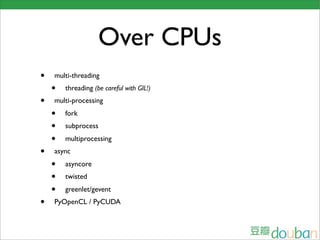










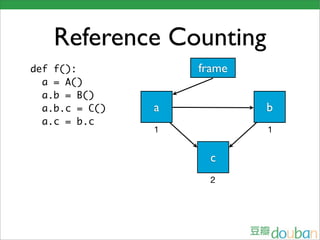






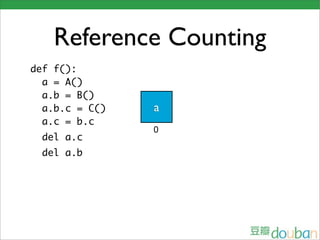



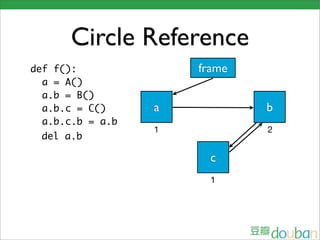

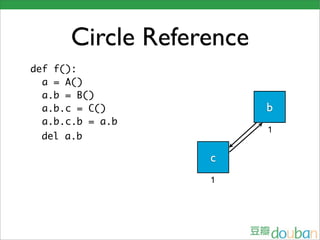
![Weak Reference
a reference not strong enough to keep an object alive
>>> import weakref import weakref
>>> class Object:
... pass _id2obj_dict = weakref.WeakValueDictionary()
...
>>> o = Object() def remember(obj):
>>> r = weakref.ref(o) oid = id(obj)
>>> o2 = r() _id2obj_dict[oid] = obj
>>> o is o2 return oid
True
>>> del o, o2 def id2obj(oid):
>>> print r() return _id2obj_dict[oid]
None](https://image.slidesharecdn.com/pythonpublic-111027213401-phpapp01/85/Python-69-320.jpg)







![#include <Python.h>
static PyObject *SpamError;
static PyObject *
spam_system(PyObject *self, PyObject *args)
{
const char *command;
int sts;
if (!PyArg_ParseTuple(args, "s", &command))
return NULL;
sts = system(command);
if (sts < 0) {
PyErr_SetString(SpamError, "System command failed");
return NULL;
}
return PyLong_FromLong(sts);
}
static PyMethodDef SpamMethods[] = {
{"system", spam_system, METH_VARARGS,
"Execute a shell command."},
{NULL, NULL, 0, NULL} /* Sentinel */
};
PyMODINIT_FUNC
initspam(void)
{
PyObject *m;
m = Py_InitModule("spam", SpamMethods);
if (m == NULL)
return;
SpamError = PyErr_NewException("spam.error", NULL, NULL);
Py_INCREF(SpamError);
PyModule_AddObject(m, "error", SpamError);
}](https://image.slidesharecdn.com/pythonpublic-111027213401-phpapp01/85/Python-77-320.jpg)
![Building with
setuptools
from setuptools import setup, Extension
module1 = Extension('spam',
sources = ['spam.c'])
setup (name = 'PackageName',
version = '1.0',
description = 'This is a demo package',
ext_modules = [module1])
python setup.py install
python setup.py build_ext --inplace](https://image.slidesharecdn.com/pythonpublic-111027213401-phpapp01/85/Python-78-320.jpg)
![Parse and Build Values
• int PyArg_ParseTuple(PyObject *args,
const char *format, ...)
• int PyArg_ParseTupleAndKeywords(PyObject
*args, PyObject *kw, const char *format,
char *keywords[], ...)
• int PyArg_BuildValue(const char
*format, ...)](https://image.slidesharecdn.com/pythonpublic-111027213401-phpapp01/85/Python-79-320.jpg)




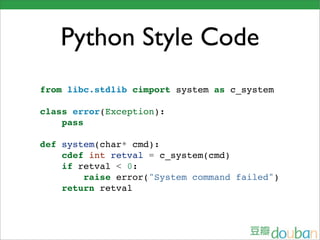
![setup.py
from setuptools import setup, Extension
from Cython.Distutils import build_ext
extmod = Extension("spam", sources=['spam.pyx'])
setup(
name="Spam",
cmdclass = {'build_ext': build_ext},
ext_modules = [extmod])](https://image.slidesharecdn.com/pythonpublic-111027213401-phpapp01/85/Python-85-320.jpg)
![#include <Python.h>
#include "structmember.h"
static PyGetSetDef Noddy_getseters[] = {
Extension Types
typedef struct { {"first",
PyObject_HEAD (getter)Noddy_getfirst, (setter)Noddy_setfirst,
PyObject *first; "first name",
PyObject *last; NULL},
int number; {"last",
} Noddy; (getter)Noddy_getlast, (setter)Noddy_setlast,
"last name",
static void NULL},
Noddy_dealloc(Noddy* self) {NULL} /* Sentinel */
{ };
Py_XDECREF(self->first);
Py_XDECREF(self->last); static PyObject *
self->ob_type->tp_free((PyObject*)self); Noddy_name(Noddy* self)
} {
static PyObject *format = NULL;
static PyObject * PyObject *args, *result;
Noddy_new(PyTypeObject *type, PyObject *args, PyObject *kwds)
{ if (format == NULL) {
Noddy *self; format = PyString_FromString("%s %s");
if (format == NULL)
self = (Noddy *)type->tp_alloc(type, 0); return NULL;
if (self != NULL) { }
self->first = PyString_FromString("");
if (self->first == NULL) args = Py_BuildValue("OO", self->first, self->last);
{ if (args == NULL)
Py_DECREF(self); return NULL;
return NULL;
} result = PyString_Format(format, args);
Py_DECREF(args);
self->last = PyString_FromString("");
if (self->last == NULL) return result;
{ }
Py_DECREF(self);
return NULL; static PyMethodDef Noddy_methods[] = {
} {"name", (PyCFunction)Noddy_name, METH_NOARGS,
"Return the name, combining the first and last name"
self->number = 0; },
} {NULL} /* Sentinel */
};
return (PyObject *)self;
} static PyTypeObject NoddyType = {
PyObject_HEAD_INIT(NULL)
static int 0, /*ob_size*/
Noddy_init(Noddy *self, PyObject *args, PyObject *kwds) "noddy.Noddy", /*tp_name*/
{ sizeof(Noddy), /*tp_basicsize*/
PyObject *first=NULL, *last=NULL, *tmp; 0, /*tp_itemsize*/
(destructor)Noddy_dealloc, /*tp_dealloc*/
static char *kwlist[] = {"first", "last", "number", NULL}; 0, /*tp_print*/
0, /*tp_getattr*/
if (! PyArg_ParseTupleAndKeywords(args, kwds, "|SSi", kwlist, 0, /*tp_setattr*/
&first, &last, 0, /*tp_compare*/
&self->number)) 0, /*tp_repr*/
return -1; 0, /*tp_as_number*/
0, /*tp_as_sequence*/
if (first) { 0, /*tp_as_mapping*/
tmp = self->first; 0, /*tp_hash */
Py_INCREF(first); 0, /*tp_call*/
self->first = first; 0, /*tp_str*/
Py_DECREF(tmp); 0, /*tp_getattro*/
} 0, /*tp_setattro*/
0, /*tp_as_buffer*/
if (last) { Py_TPFLAGS_DEFAULT | Py_TPFLAGS_BASETYPE, /*tp_flags*/
tmp = self->last; "Noddy objects", /* tp_doc */
Py_INCREF(last); 0,! ! /* tp_traverse */
self->last = last; 0,! ! /* tp_clear */
Py_DECREF(tmp); 0,! ! /* tp_richcompare */
} 0,! ! /* tp_weaklistoffset */
0,! ! /* tp_iter */
return 0; 0,! ! /* tp_iternext */
} Noddy_methods, /* tp_methods */
Noddy_members, /* tp_members */
static PyMemberDef Noddy_members[] = { Noddy_getseters, /* tp_getset */
{"number", T_INT, offsetof(Noddy, number), 0, 0, /* tp_base */
"noddy number"}, 0, /* tp_dict */
{NULL} /* Sentinel */ 0, /* tp_descr_get */
}; 0, /* tp_descr_set */
0, /* tp_dictoffset */
static PyObject * (initproc)Noddy_init, /* tp_init */
Noddy_getfirst(Noddy *self, void *closure) 0, /* tp_alloc */
{ Noddy_new, /* tp_new */
Py_INCREF(self->first); };
return self->first;
} static PyMethodDef module_methods[] = {
{NULL} /* Sentinel */
static int };
Noddy_setfirst(Noddy *self, PyObject *value, void *closure)
{ #ifndef PyMODINIT_FUNC! /* declarations for DLL import/export */
if (value == NULL) { #define PyMODINIT_FUNC void
PyErr_SetString(PyExc_TypeError, "Cannot delete the first attribute"); #endif
return -1; PyMODINIT_FUNC
} initnoddy3(void)
{
if (! PyString_Check(value)) { PyObject* m;
PyErr_SetString(PyExc_TypeError,
"The first attribute value must be a string"); if (PyType_Ready(&NoddyType) < 0)
return -1; return;
}
m = Py_InitModule3("noddy3", module_methods,
Py_DECREF(self->first); "Example module that creates an extension type.");
Py_INCREF(value);
self->first = value; if (m == NULL)
return;
return 0;
} Py_INCREF(&NoddyType);
PyModule_AddObject(m, "Noddy", (PyObject *)&NoddyType);
static PyObject * }
Noddy_getlast(Noddy *self, void *closure)
{
Py_INCREF(self->last);
return self->last;
}
static int
Noddy_setlast(Noddy *self, PyObject *value, void *closure)
{
if (value == NULL) {
PyErr_SetString(PyExc_TypeError, "Cannot delete the last attribute");
return -1;
}
if (! PyString_Check(value)) {
PyErr_SetString(PyExc_TypeError,
"The last attribute value must be a string");
return -1;
}
Py_DECREF(self->last);
Py_INCREF(value);
self->last = value;
return 0;
}](https://image.slidesharecdn.com/pythonpublic-111027213401-phpapp01/85/Python-86-320.jpg)
![#include <Python.h>
#include "structmember.h"
static PyGetSetDef Noddy_getseters[] = {
Extension Types
typedef struct { {"first",
PyObject_HEAD (getter)Noddy_getfirst, (setter)Noddy_setfirst,
PyObject *first; "first name",
PyObject *last; NULL},
int number; {"last",
} Noddy; (getter)Noddy_getlast, (setter)Noddy_setlast,
"last name",
static void NULL},
Noddy_dealloc(Noddy* self) {NULL} /* Sentinel */
{ };
Py_XDECREF(self->first);
Py_XDECREF(self->last); static PyObject *
self->ob_type->tp_free((PyObject*)self); Noddy_name(Noddy* self)
} {
static PyObject *format = NULL;
static PyObject * PyObject *args, *result;
Noddy_new(PyTypeObject *type, PyObject *args, PyObject *kwds)
{ if (format == NULL) {
Noddy *self; format = PyString_FromString("%s %s");
if (format == NULL)
self = (Noddy *)type->tp_alloc(type, 0); return NULL;
if (self != NULL) { }
self->first = PyString_FromString("");
if (self->first == NULL) args = Py_BuildValue("OO", self->first, self->last);
{ if (args == NULL)
Py_DECREF(self); return NULL;
return NULL;
} result = PyString_Format(format, args);
Py_DECREF(args);
self->last = PyString_FromString("");
if (self->last == NULL) return result;
{
Py_DECREF(self);
}
cdef class Noddy:
return NULL; static PyMethodDef Noddy_methods[] = {
} {"name", (PyCFunction)Noddy_name, METH_NOARGS,
"Return the name, combining the first and last name"
},
"""Noddy objects"""
self->number = 0;
} {NULL} /* Sentinel */
};
return (PyObject *)self;
}
static int
static PyTypeObject NoddyType = {
PyObject_HEAD_INIT(NULL)
0, /*ob_size*/
cdef object first, last
"noddy.Noddy", /*tp_name*/
Noddy_init(Noddy *self, PyObject *args, PyObject *kwds)
{
PyObject *first=NULL, *last=NULL, *tmp;
sizeof(Noddy),
0,
/*tp_basicsize*/
/*tp_itemsize*/
cdef public int number
(destructor)Noddy_dealloc, /*tp_dealloc*/
static char *kwlist[] = {"first", "last", "number", NULL}; 0, /*tp_print*/
0, /*tp_getattr*/
if (! PyArg_ParseTupleAndKeywords(args, kwds, "|SSi", kwlist, 0, /*tp_setattr*/
&first, &last,
&self->number))
0,
0,
0,
/*tp_compare*/
/*tp_repr*/
/*tp_as_number*/
def __cinit__(self, str first="", str last="", int number=0):
return -1;
if (first) {
0,
0,
0,
/*tp_as_sequence*/
/*tp_as_mapping*/
/*tp_hash */
self.first = first
tmp = self->first;
Py_INCREF(first);
self->first = first;
Py_DECREF(tmp);
0,
0,
0,
/*tp_call*/
/*tp_str*/
/*tp_getattro*/
self.last = last
0, /*tp_setattro*/
}
if (last) {
0, /*tp_as_buffer*/
Py_TPFLAGS_DEFAULT | Py_TPFLAGS_BASETYPE, /*tp_flags*/
self.number = number
tmp = self->last; "Noddy objects", /* tp_doc */
Py_INCREF(last); 0,! ! /* tp_traverse */
self->last = last; 0,! ! /* tp_clear */
Py_DECREF(tmp); 0,! ! /* tp_richcompare */
} 0,!
0,!
0,!
!
!
!
/* tp_weaklistoffset */
/* tp_iter */
/* tp_iternext */
property first:
return 0;
} Noddy_methods,
Noddy_members,
Noddy_getseters,
/* tp_methods */
/* tp_members */
/* tp_getset */
"""first name"""
static PyMemberDef Noddy_members[] = {
{"number", T_INT, offsetof(Noddy, number), 0,
"noddy number"},
{NULL} /* Sentinel */
0,
0,
0,
/* tp_base */
/* tp_dict */
/* tp_descr_get */
def __get__(self):
0, /* tp_descr_set */
};
static PyObject *
0,
(initproc)Noddy_init,
/* tp_dictoffset */
/* tp_init */
return self.first
Noddy_getfirst(Noddy *self, void *closure) 0, /* tp_alloc */
{
Py_INCREF(self->first); };
Noddy_new, /* tp_new */
def __set__(self, str value):
return self->first;
} static PyMethodDef module_methods[] = {
};
{NULL} /* Sentinel */ self.first = value
static int
Noddy_setfirst(Noddy *self, PyObject *value, void *closure)
{ #ifndef PyMODINIT_FUNC! /* declarations for DLL import/export */
if (value == NULL) { #define PyMODINIT_FUNC void
}
PyErr_SetString(PyExc_TypeError, "Cannot delete the first attribute");
return -1;
#endif
PyMODINIT_FUNC
initnoddy3(void)
property last:
{
if (! PyString_Check(value)) {
PyErr_SetString(PyExc_TypeError,
PyObject* m; """last name"""
"The first attribute value must be a string"); if (PyType_Ready(&NoddyType) < 0)
}
return -1; return;
def __get__(self):
m = Py_InitModule3("noddy3", module_methods,
Py_DECREF(self->first);
Py_INCREF(value);
if (m == NULL)
"Example module that creates an extension type.");
return self.last
self->first = value;
return 0;
return;
Py_INCREF(&NoddyType);
def __set__(self, str value):
}
static PyObject *
Noddy_getlast(Noddy *self, void *closure)
}
PyModule_AddObject(m, "Noddy", (PyObject *)&NoddyType);
self.last = value
{
Py_INCREF(self->last);
return self->last;
}
static int
def name(self):
Noddy_setlast(Noddy *self, PyObject *value, void *closure)
{
if (value == NULL) {
"""Return the name, combining the first and last name"""
PyErr_SetString(PyExc_TypeError, "Cannot delete the last attribute");
}
return -1;
return "%s %s" % (self.first, self.last)
if (! PyString_Check(value)) {
PyErr_SetString(PyExc_TypeError,
"The last attribute value must be a string");
return -1;
}
Py_DECREF(self->last);
Py_INCREF(value);
self->last = value;
return 0;
}](https://image.slidesharecdn.com/pythonpublic-111027213401-phpapp01/85/Python-87-320.jpg)


